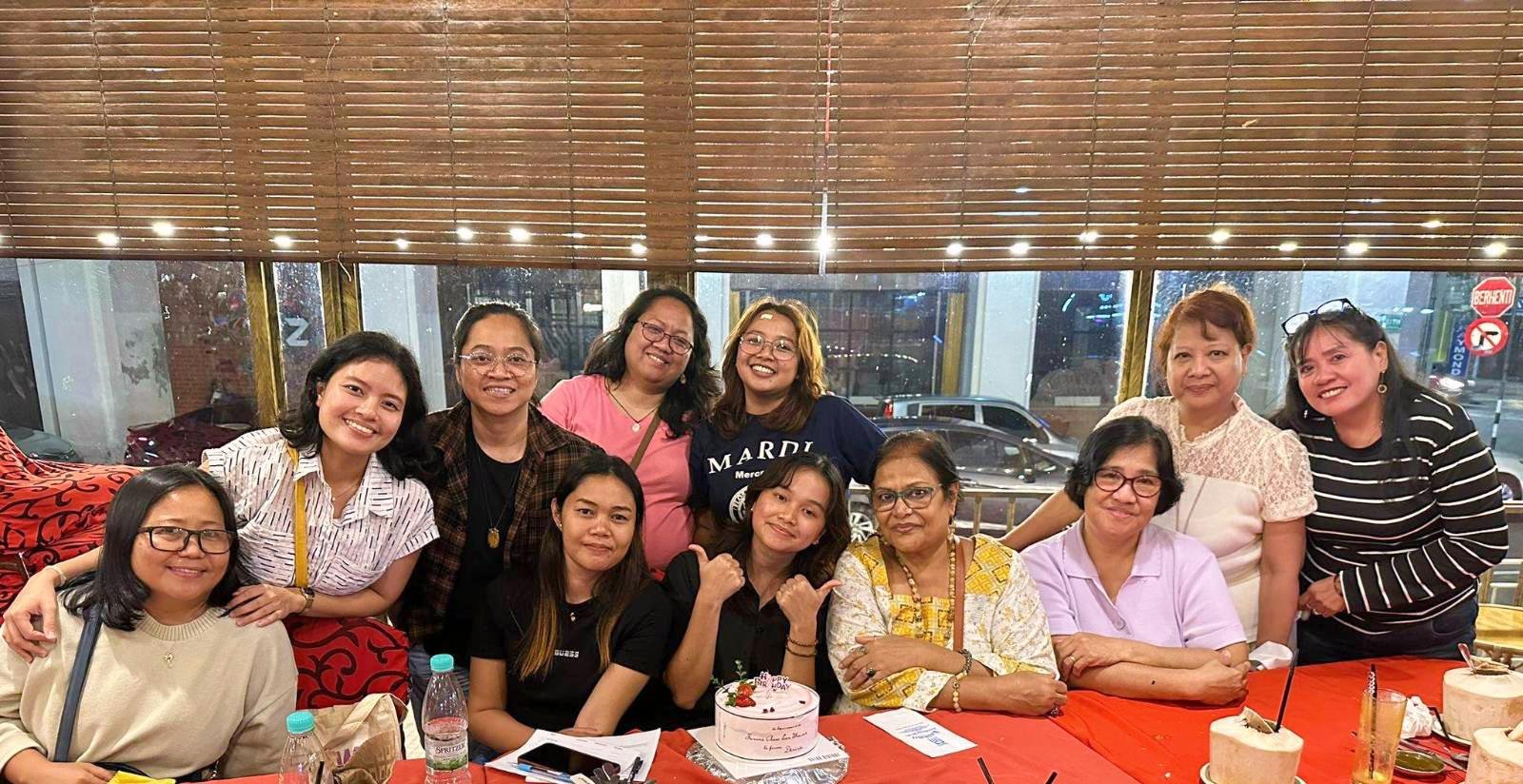Breaking Bread, Building Bonds: A Discussion of Migrant Women Advocates over Dinner in Penang
Strong and persevering migrant leaders and advocates gathered for dinner last June 18, 2024 in Penang, Malaysia to have a conversation on the multifaceted challenges faced by migrant women in Asia Pacific. The attendees included leaders from different grassroots and advocacy organizations such as Films4Peace Foundation, Togetherness of the Enlightened Women for Reforms, Equality, Sustainability and Action (TERESA), SAMAKANA, Gabriela Hong Kong, Beranda Migran, Gabriela UAE, KAUGNAY, KARAMAY, Asia Pacific Mission for Migrants (APMM), and Indonesian Migrant Worker’s Union (IMWU), who shared shared the struggles of migrants and migrant women in their countries and their organizations’ goals in facilitating support and empowerment:
Sheepa Hafiza of Films4Peace Foundation emphasized the necessity of supporting returning migrants and their families. She initiated a discourse on the types of initiatives they do to aid returning migrants in Bangladesh, such as entrepreneurial opportunities and livelihood training programs. This set the tone for a series of rich discussions on the issues faced by migrants and their families.
Juliet Egar from TERESA highlighted the need for counseling sessions particularly for Filipino seasonal workers in South Korea, who are employed through irregular recruitment practices and on a temporary basis. They face financial exploitation where they are required to make deposits to prevent overstaying, and underpayment. Juliet underscores how the psychological and emotional toll of these on seasonal workers brings about the need for comprehensive support systems that their organization aims to provide as well.
Maria Louisa Ricafort of SAMAKANA brought attention to the plight of marriage migrants, runaway brides, and silent divorces in Japan. She pointed out the paradoxical situation where, despite facing abuse, many women are forced to remain dependent on their spouses to retain their visa status and continue their work abroad. This is a clear-cut reminder of the vulnerabilities inherent in the current migration regime, along with conservative social structures such as patriarchy and misogyny.
An observation on the resilience of migrants was shared by Sheila Tebia of Gabriela Hong Kong. Despite their struggles, many migrants tend to project an image of strength so that they would not worry their loved ones. This facade often conceals the harsh realities that women migrants face, and underscores the need to build deeper trust, support, and understanding among the organizations.
Hanindha Kristy talked about Beranda Migran’s efforts to create a welcoming home for migrants and their families. The organization’s initiatives, including a parenting program and gender sensitivity trainings, aim to foster a supportive community environment for returned migrants who faced different kinds of abuse and hardships abroad.
Teresa “Terry” Apitan of Gabriela UAE delved into the issues faced by migrants in the Middle East, discussing third-country recruitment and the Kafala system, and contract substitution. Third-country recruitment involves agencies hiring workers from one country to work in another. After their contracts end, vulnerable migrant workers often move to a third country under misleading contracts. While the Kafala system links workers' legal residency to their employers, giving employers significant control over the workers' movement and employment status. Terry expressed her disappointment in the Philippine government’s lack of support, emphasizing that organizations like hers must tirelessly provide essential assistance to (OFWs) in the Middle East—a responsibility that should rightfully be fulfilled by the government. Adele from KARAMAY and Connie from KAUGNAY shared their insights and experiences, highlighting the different challenges they faced as a service worker in Malaysia and a teacher in Thailand.
Sringatin of IMWU highlighted the systemic nature of migration issues especially in Southeast Asian countries, where there is concentration of land ownership among a few elite landlords, forcing many vulnerable populations to seek better opportunities in cities and abroad. She stressed the importance of supporting and organizing migrant families. Sring also noted how education, influenced and controlled by big businesses and foreign interests, perpetuates a system that makes students a reserve for cheap and docile labor.
Charting a Path Forward
APMM’s partners collectively emphasized the importance of creating meaningful spaces for migrant women and advocates to share their challenges and solidarities. Such spaces foster mutual support and enable the exchange of their experiences and strategies for campaigns. These spaces serve as avenues for advocacy and collective learning which facilitate solution-building aligned with the actual realities of migrants. Especially in a time of compounded crises, engaging in conversations that put migrants at the center significantly contribute to their empowerment.
They also underscored the need for better support systems for returning migrants, concrete policies to protect marriage migrants, fair wages, end of slave-like systems like the Kafala, and greater government accountability in supporting migrant women across the region. But ultimately, women migrant leaders and advocates continuously clamor for the end of forced labor. Such a systemic issue has been putting the lives and rights of migrant women at risk. Amidst all these, with the coming together of grassroots migrants and advocates, and through the forging of strong unities, changes in the system are possible and genuine empowerment of migrant women can be attained by many.

